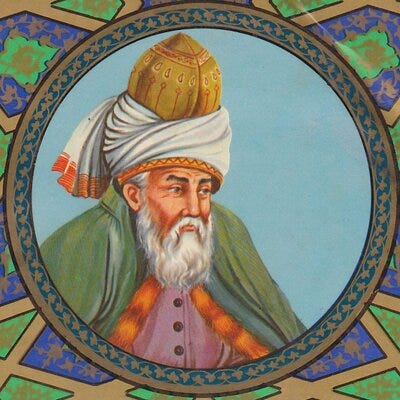Jalāl al-Dīn Muhammad Rumi was a Sufi master and mystic who lived in the 13th century. Some 800 years later, he is one of the best selling poets extant, and the best-selling poet in the United States. All of this was accomplished without a Twitter feed or his own Facebook page. Must have had pull with the powers-that-be.
Rumi’s writing has had a positive impact on untold numbers of people throughout the centuries. His teachings encompass most facets of life and human behavior: love, relationships, self, divinity and other weighty, existential topics.
He is not known, though, for his thinking on organizations and organizational behavior. This shows the limited imagination of most folks running them. Much of Rumi’s advice can be applied to the working world.
This brings us back to last week’s post, and the difficulty in changing organizational dynamics from within.
Change is hard; we know that. Google “how to create effective organizational change” and you get 342,000,000 results in 1/2 second. Clearly, many folks have advice on the subject. Yet despite an ample amount of guidance, individuals and organizations still have difficulty creating lasting, meaningful change.
Why? Let’s ask Rumi. One of his more famous quotes is:
“Yesterday I was clever, so I wanted to change the world. Today I am wise, so I am changing myself.” Ah…look inside first.
There is a Sufi story that is reinforces that guidance:
One day, people saw Mullah Nasruddin out in the street searching frantically for something.
“What are you searching for, Mullah? They inquired.
“I’ve lost my key” replied Mullah.
The helping nature of mankind was at work. So everyone joined him, trying to help him
After some search someone had the urge to ask the place where exactly, the key was lost. So that more condensed search could be made. So, the inquiry was made for the same to Nasruddin.
“I lost the key in the house,” replied Mullah matter-of-factly.
“Then why are you searching for it in the street?” was the obvious question asked to him.
“Because there is more light here.” Replied the Mullah.
How does this take apply to organizational behavior? It’s this: We tend to look in the wrong place for the keys to success. Lasting change starts within. This is universally applicable, but seldom applied.
And while it may seem controversial to some, it is also not a novel concept. As lawyer turned author Dan Pink says: It is a true fact.
Most managers ignore what social science has proven: People find most meaning at work when they feel they have a stake in the work that they do.
Behavioral economist Dan Ariely has also buttressed this through his experiments: management’s view of labor and motivation are often naive and nonsensical. Money is not the sole motivator of behavior in an organization. Being valued is.
I suspect that most of us have experienced this in our careers, and have felt at times powerless to change the way we work. It is a demeaning and diminishing feeling.
The most effective changes are created organically, when the entire workplace is involved in the decision-making. Top-down, hierarchically-designed and imposed change is often resented, at best, and ignored or undermined at worst. When you don’t give someone a voice, they tend to use their feet.
That is now changing, and organizations are facing resignations and labor shortages because they are not adapting, and many are not involving their people in discussions, much less decisions. This is affecting customers, and impacting profits.
It’s time to change this paradigm for good and to let go of outmoded ways of thinking and being.
“When you let go of who you are, you become who you might be.” - Rumi





Was it you who used the Stephen Hawking quote:
Everyone can enjoy a life of luxurious leisure if the machine-produced [robots] wealth is shared, or most people can end up miserably poor if the machine-owners successfully lobby against wealth redistribution. So far, the trend seems to be toward the second option, with technology driving ever-increasing inequality.
Each of us has value.